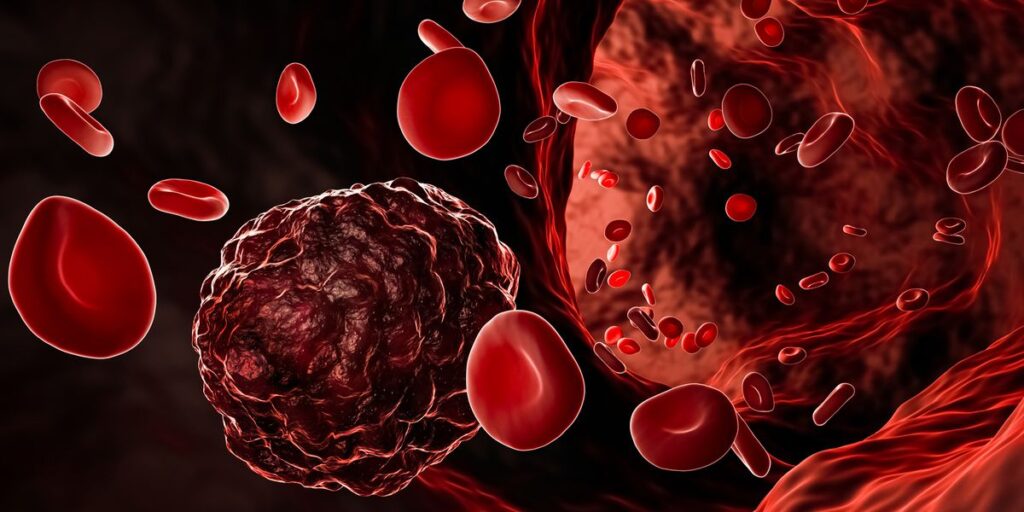
Your blood, which makes up roughly 8% of your average body weight, is crucial to how your body works. All of your organs receive oxygen, nutrition, hormones, and antibodies from your blood as it flows throughout your vascular system. Plasma, the fluid that carries cells, waste, and nutrients, and blood cells are practically equally distributed throughout the blood. The most cases, excessive and abnormal growth of white blood cells is the cause of cancer in the blood. Men are more likely to develop blood cancer, such as leukemia, lymphoma, and myeloma, than women. About 25% of all childhood cancer are caused by childhood leukemia. Read more to know in detail about blood cancer:
What is Blood Cancer?
Blood cancer affects both the production and functionality of blood cells in your body. Your bone marrow, the sponge-like substance in the middle of your bones, is where the majority of blood cancer begins. Red blood cells, white blood cells, and platelets are all developed from stem cells in your bone marrow. Blood cancer develops when anything interferes with your body’s normal blood cell production. Blood cancer causes an overabundance of abnormal blood cells, which leads to illnesses. But with the invention of new ways of treating blood cancer, many people are surviving longer than ever.
Causes of Blood Cancer
Despite the fact that the precise cause is yet unclear, there are some factors connected to the development of blood cancer. For instance, a disease called leukemia is caused by a mix of hereditary and environmental factors. Leukemia develops when specific blood cells have DNA mutations. This more closely resembles the instructions that every cell has and that will further direct its behavior. A few typical causes include old age, a weakened immune system, a family history, and certain diseases.
Symptoms of Blood Cancer
Each kind of blood cancer is unique, but it might have some similar symptoms and warning signals. Some blood cancer patients might not exhibit any symptoms until the condition has progressed. They might even think they have the flu or a terrible cold. Typical signs of blood cancer include:
- Chest discomfort or coughing – A accumulation of abnormal blood cells in your spleen could be the cause for it.
- Frequent infections – Lack of white blood cells to combat common pathogens is one potential explanation.
- Chills or a fever – Lack of white blood cells, which causes infections to occur more frequently.
- Unexpected bruising, bleeding, or rash. Lack of platelets, which are the cells that aid in blood clotting, may be the cause.
- Unexpected rash, bleeding or bruising – Lack of platelets, the cells that aid in blood clotting.
- Nausea or a loss of appetite – A buildup of abnormal blood cells in your spleen that puts pressure on your stomach is a potential cause.
- Constant exhaustion and weakness – Lack of sufficient red blood cells may be the culprit (anemia).
- Breathing difficulties – Anemia may be the root cause.
- In the groin, armpits, or neck, swollen, painless lymph nodes – A buildup of aberrant white blood cells in your lymph glands is one potential cause.
Types of Blood Cancer
Leukemia
It is a cancer of white blood cells. Your body’s bone marrow is where blood cells are created. Immature blood cells divide quickly and do not develop into mature cells when a patient has leukemia. Your bone marrow is prevented from producing normal, healthy cells by these immature cells. In accordance with how quickly the disease progresses, leukemia can be categorized into many categories.
The development of acute leukemia is more rapid than that of chronic leukemia. Which sort of white blood cell is impacted determines the specific type of leukemia. White blood cells come in a wide varieties. They consist of lymphoid and myeloid cells. Red, white, and platelet blood cells all originate from myeloid cells. Lymphocytes, a type of white blood cell, arise from lymphoid cells.
Lymphoma
The lymph system carries white blood cells that fight infections to help your body eliminate waste. Lymphoma causes the body to produce lymphocytes that grow out of control. It makes it harder to fight infections. Lymphoma’s primary symptom is swollen lymph nodes. A bump in your neck, armpit, or groin can be apparent. A cough, shortness of breath, or pain in your chest, could be signs that lymph nodes have gone further inside your body. You can feel bloated or full as a result of expanding spleen. Although the enlarged nodes are not usually painful, drinking alcohol may make them so.
Myeloma
It is a rare blood cancer that affects your plasma cells. Your immune system contains white blood cells called plasma cells. Occasionally referred to as B cells, plasma cells produce antibodies. Immunoglobulins, which are these antibodies, aid in the battle against infection.
Multiple myeloma develops when normal cells that grow and produce abnormal antibodies known as M proteins transform into abnormal cells. This alteration sets off a chain reaction of illnesses and disorders that can harm your bones and kidneys. It also affects the production of healthy red, white, and platelet-rich blood cells by your body.
When to See a Surgeon?
Knowing whether to be concerned might be challenging because many early cancer symptoms are not very specific. But don’t wait, early diagnosis can result in quicker, more effective therapy. Any signs of blood cancer that persist for more than a few weeks without getting better should be evaluated by a doctor. Some people are concerned about “bothering” their doctor even if they only have the flu or a cold. But your doctor would rather see you promptly to make any diagnosis.
Blood Cancer Treatment in India
Indian hospitals are well equipped to treat blood cancer patients at affordable packages. Not only Indian hospitals offer quality treatment at par with developed countries but also blood cancer treatment cost in India is low compared to to those developed countries.
The survival rate of blood cancer patients after getting treated in India is around 75%. Normally if the cancer is found out much earlier, then there will be a high chance of survival rate.
Bottom Line
Learning you have a kind of blood cancer is a serious business because blood cancer is a serious problem. Ask your doctor to explain how blood cancer will affect you, your treatment options, and what to expect if you have it.
Read More: Healthy Eating Hints




